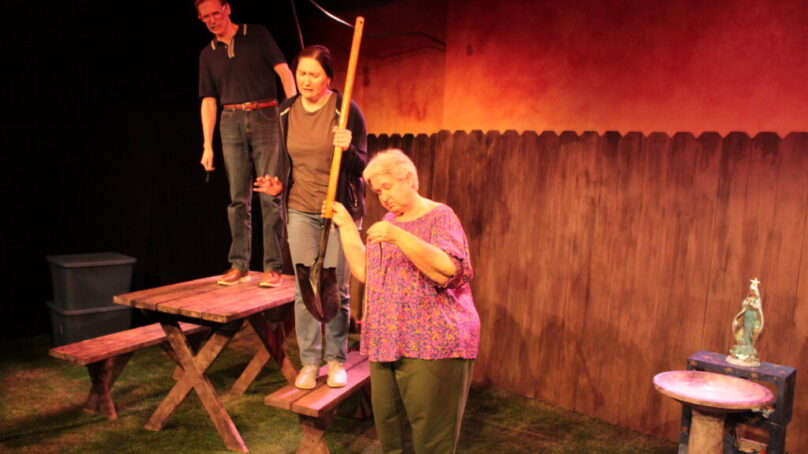

Photo courtesy of Ronnie Larsen Presents and Plays of Wilton
(From left) Bruce Linser, Lindsey Corey, and Elizabeth Dimon appear in a scene from the world premiere production of Erin K. Considine’s drama, Family Tree.
By AARON KRAUSE
In at least one previous review, I used the terms “Theater of Relatability” and “Theater of Recognition.”
While I doubt that critics or scholars have coined these exact words to describe a genre of theater, Erin K. Considine’s heartbreaking but also humorous, richly symbolic new play, Family Tree, would certainly fall under such categories if they existed. Indeed, many people are likely to see themselves or someone they know or love through the piece and its characters.
Through May 12, the play is experiencing its world premiere in an intense and believable professional co-production between the nonprofit organizations Ronnie Larsen Presents and Plays of Wilton. The venue is the intimate Foundry space in Wilton Manors, where renowned, versatile theater artist Ronnie Larsen (producer, playwright, director, actor) set up shop some time ago. One of his plays, The Actors, which previously played the Foundry, is running Off-Broadway.
At just about 75 minutes with no intermission, Family Tree is compelling, taut, and focused, without a wasted word or action.
The cast comprises three of South Florida’s finest actors — Lindsey Corey, Elizabeth Dimon, and Bruce Linser. No doubt, through their splendid performances, they have earned among the highest compliments you can give performers. Specifically, under Margaret M. Ledford’s careful direction, the actors sound as though they are saying their lines for the first time. In addition, their gestures and actions appear spontaneous. In short, you never sense that they are “acting.” Rather, you feel as though you are seeing and hearing real people, in real time, dealing with issues that are, unfortunately, real and frightening. At times, the actors shake, but it’s clearly not because the performers have stage fright. Rather, the shaking reinforces the characters emotions.
The play takes place during the present in California, some distance from San Francisco.
As the years have passed, the relationship between siblings Gavin and Calista has splintered. In fact, an abusive father who has since died, resentments, and lack of communication have soured their feelings toward each other. Calista, who cannot seem to keep a job or a boyfriend, may be aimless. She lives rent free in her and her brother’s worn childhood home with their aging mother, Isabella. Unfortunately, at age 66, mom has developed early onset Alzheimer’s Disease. As a result, she cannot verbally communicate with others and her memory is fading.
Gavin, a gay man whose Power of Attorney grants him the green light to make decisions on his mother’s behalf, lives in San Francisco. There, he works as a marketing manager for online storefronts. Also, he is about to form a new family. Life is good for him in the Bay Area and he is happy. Clearly, he has moved on from his troubled biological family.
Repeatedly, though, problems arise at their childhood home, and Calista has more than once asked her brother to drop everything, come over, and fix them. Reluctantly, he responded when his sister called him. But Gavin has just about reached the end of his patience.
Clearly, mom will only worsen as time passes. That has caused a further rift between the siblings. Calista, who once worked for a bank, thinks she can adequately care for her mother in their old house. But Gavin insists that Isabella needs and deserves specialized care that she can only receive in a nursing home. Before Family Tree ends, can the siblings civilly reach an agreement without killing each other or tearing the house down before California’s raging wildfires destroy it?
At least a couple of plot twists reveal secrets that come to light during the play. If you experience this piece, and you most definitely should, remember not to spoil it for others.
Undoubtedly, Considine is a name to remember in live theater. She has included rich symbolism in her play, and writes in a lively, vivid style. No doubt, Family Tree has earned the right for people to call it literature. The charred tree in the backyard and the raging California wildfires that make the house and area smell like smoke could surely symbolize Isabella’s fast fading life. And the broken Virgin Mary statue could stand for mom’s fragile life about to crack.
With Calista and Isabella experiencing a sense of regret and frustration about how their lives have turned out, there is a Chekhovian quality to Considine’s writing. Certainly, the realism suffusing the play can also remind one of Russian playwright Anton Chekhov’s work. In addition, there is a hint of Arthur Miller in the play with the hostility that existed between Gavin and his father. Also, the play may bring to mind Neil Simon, with Considine’s obvious ability to find humor in dark, everyday situations. Truly, without its humor, Family Tree would be unbearably depressing.
Considine, an Atlanta-area, award-winning playwright, writes with compassion but honesty about important themes and issues. For instance, the playwright touches on the power of art, change, the different definitions of “family,” moving on vs. remaining in the past, forgiveness, the chance to start over in life, living life as a gay man in modern times, and adult offspring caring for aging and ailing parents. While the playwright doesn’t delve into the issues in depth, she certainly gives us things to think about on our way home from the theater. And, chances are, this play will stay with you well after the actors take their well-deserved bows.
Consider that the number of Americans ages 65 and older is projected to increase from 58 million in 2022 to 82 million by 2050, a 47 percent increase. Of course, a sharp increase in older folks means they may need specialized care.
True, Family Tree is not a groundbreaking or entirely original new play. As a matter of fact, many gay men may recognize the play’s premise of a gay son returning to his childhood home, that individual’s abusive father, the advancing dementia of his aging mother, and a sister who is afraid to move on. But Family Tree is also a refreshing, modern piece of gay literature. The writer doesn’t limit her piece to the issue of coming out vs remaining in the closet. Rather, she writes about a strong, happy gay man who is doing something with his life, including starting a new family with children.
The play’s title may refer to the fact that these days, the definition of a family (or family tree) extends beyond the nuclear unit of mom, dad, kids, and dog.
In Family Tree, Considine uses a device through which, in addition to the play’s dialogue, a clear, lucid, and communicative Isabella addresses the audience in monologues and asides. She tells us what the stricken Isabella probably wished she could tell us and her children. It is as though a well, lucid Isabella is hidden inside that person’s ailing body, and emerges when the character addresses the audience. This allows us to learn more about Isabella. In fact, Considine could have used these moments to tell us even more about the character. Certainly, there is room to flesh out the play, as it runs for just over an hour. For instance, what was Isabella’s vocation and hobbies? Alas, we never learn such information.
Dimon, a veteran, award-winning actor, shines as Isabella. With a vacant stare, she looks like a confused or innocent child and believably sounds like one while talking in a whiny, child-like voice. When Isabella addresses us, Dimon at times assumes a joyful, peaceful demeanor while remembering the past. During other moments, she is in obvious emotional pain. Dimon’s vulnerability as Isabella makes you want to comfort her. Repetitive motions, such as tapping, reinforces the character’s anxiety.
Meanwhile, with lowered eyebrows and a sharp voice, Corey nails Calista’s bitterness and disappointment at her brother.
While Corey is convincingly angry as Calista, the actor also imbues her character with a rambunctious and playful energy. This comes in handy during at least one of the play’s more lighthearted moments. Watching Corey during these times, you feel as though you’re watching a hyper child. And you sense Calista’s love for her mother and, at times, even her brother.
Speaking of him, Linser plays Gavin intensely, yet naturally. In particular, the actor switches seamlessly from playing a nerdy, melodramatic, and sarcastic drama queen to a driven individual who is adamant on securing for his mother the best possible care. Fortunately, in addition to his undesirable traits, Gavin harbors likable qualities, and Linser ensures that we see all sides to his character in a bravura performance.
Tender moments exist between the characters, thanks to the strong chemistry that the actors share with each other. And Ledford, as the director, gives such moments the emphasis they need. In addition to deftly pacing the production, Ledford’s staging is smart. For instance, at one point, she positions Corey so that Calista’s back faces her brother while they are talking. This clearly communicates to us that the siblings are not on friendly terms. To her credit, Ledford gives equal weight to the dark and comical portions of the play.
Scenic designers Jordon Armstrong and John Barry Green have created a realistic-looking backyard and exterior of the house. We see what resembles real turf or real grass. Also, the mud-caked exterior of the siblings’ childhood home looks like an aging house that has seen better days. Other detail, such as a realistic looking brown fence, a reddish backdrop to suggest a fire, a tool, and a hose, further completes the picture. The hose snakes its way across the yard not in a straight line, but in loops. This can suggest the idea that life is often not a simple, straight and comfortable journey, but an experience with twists and turns.
Meanwhile, lighting designer Preston Bircher bathes the stage in bright, realistic light during regular scenes featuring dialogue. And Bircher appropriately dims the lights during Isabella’s monologues, to suggest memory.
The actors wear Casey Sacco’s dark-colored clothing which befits a play with serious issues.
Unquestionably, Family Tree is an upsetting play. But it deals with unavoidable aspects of life, and live theater holds a mirror up to society and life. Besides, if you value strong acting, this is a must-experience production. As for the play itself, it deserves a long theatrical life well beyond its impressive world premiere.
IF YOU GO
WHAT: World premiere co-production of Family Tree by Erin K. Considine.
WHEN: Through Sunday, May 12. Showtimes are at 8 p.m. on Thursday, Friday, and Saturday, as well as 3 p.m. on Sunday.
WHERE: The Foundry, 2306 Dixie Highway in Wilton Manors.
HOW MUCH: Tickets start at $37.50. Call 954-826-8790 or go to www.playsofwilton.com.

Photo courtesy of Ronnie Larsen Presents and Plays of Wilton
Here is Isabella (Elizabeth Dimon) during one of her happier moments.

Aaron Krause writes about theater and the arts.
